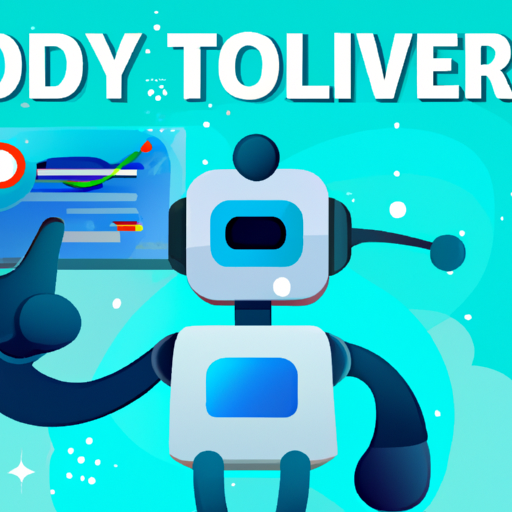
Are you ready to take your online business to the next level? Look no further, as we have compiled a list of 10 proven AI tools that can help you make money online. With the advancement of technology, artificial intelligence has become a game-changer in the business world. From automating tasks to optimizing marketing campaigns, these tools will revolutionize the way you do business. Whether you are a small business owner or an entrepreneur looking to grow your online presence, these AI tools are essential for success. Let’s dive into the world of AI and discover the amazing possibilities awaiting you.
10 Proven AI Tools That Can Help You Make Money Online
In today’s digital age, businesses are constantly seeking innovative ways to increase their profitability and reach a larger audience. Artificial Intelligence (AI) has emerged as a game-changer in this regard, offering a wide range of tools and technologies that can help businesses achieve their financial goals. From enhancing customer support to optimizing pricing strategies, AI can revolutionize the way businesses operate and ultimately help them make money online. In this article, we will explore 10 proven AI tools that can assist you in building a successful online business and boosting your revenue.

1. Chatbots
1.1. Use chatbots for customer support
Delivering exceptional customer support is an essential aspect of any successful online business. Chatbots, powered by AI, offer a cost-effective and efficient solution to handle customer queries and provide instant assistance. By implementing chatbots on your website or social media platforms, you can ensure 24/7 availability, quick response times, and personalized interactions. This not only enhances customer satisfaction but also frees up your resources to focus on other important areas of your business.
1.2. Utilize chatbots for lead generation
In addition to customer support, chatbots can also play a pivotal role in lead generation. By engaging with website visitors or social media users, chatbots can collect valuable information and qualify potential leads. Through intelligent conversations and data analysis, chatbots can gather insights about customer preferences and behavior, allowing you to tailor your marketing strategies accordingly. This targeted approach can significantly improve conversion rates and boost your online revenue.
2. Recommendation Engines
2.1. Implement personalized product recommendations
Personalization is key to attracting and retaining customers in the online marketplace. Recommendation engines, powered by AI, can analyze customers’ browsing and purchase history to provide personalized product recommendations. By leveraging machine learning algorithms, these engines can accurately predict customers’ preferences and suggest relevant items, increasing the chances of successful cross-selling and upselling. This not only enhances customer satisfaction but also drives revenue growth by increasing average order values.
2.2. Use recommendation engines to provide content suggestions
Content is crucial for engaging with your target audience and driving traffic to your website. AI-powered recommendation engines can analyze user data, such as browsing behavior and content consumption patterns, to suggest relevant articles, videos, or podcasts to your audience. By presenting them with content that aligns with their interests, you can enhance user engagement, increase time spent on your website, and ultimately monetize your content through advertisements or affiliate marketing.
3. Sentiment Analysis
3.1. Analyze customer feedback for better decision-making
Understanding the sentiments and opinions of your customers is vital for making informed business decisions. AI-powered sentiment analysis tools can process large volumes of customer feedback, such as reviews, surveys, and social media comments, to identify patterns and sentiments. By analyzing this data, you can gain valuable insights into customer preferences, identify areas for improvement, and make data-driven decisions to enhance your products or services. This, in turn, can lead to increased customer satisfaction and improved profitability.
3.2. Monitor social media sentiment to improve brand image
Maintaining a positive brand image is crucial for online success. AI tools for sentiment analysis can monitor social media platforms and analyze the sentiment behind mentions of your brand or products. By tracking customer sentiment in real-time, you can promptly address any negative feedback or comments, mitigate potential reputation damage, and take proactive steps to improve your brand perception. This not only helps in retaining existing customers but also attracts new ones, ultimately driving your online revenue.
4. Content Generation
4.1. Utilize AI-powered tools for content creation
Creating high-quality content consistently can be challenging and time-consuming. AI-powered content generation tools, such as language models and natural language processing algorithms, can assist you in generating engaging and relevant content. These tools can automate tasks like generating blog posts, social media captions, or product descriptions, saving you significant time and effort. By consistently providing valuable content to your audience, you can establish yourself as an authority in your industry, attract more visitors, and increase your online revenue.
4.2. Automate content curation and distribution
Curating and distributing content from various sources can be a daunting task. AI tools can automate this process by curating relevant content based on your target audience’s interests and preferences. With the assistance of AI, you can aggregate and organize content from diverse platforms and distribute it through various channels, such as newsletters or social media posts. By streamlining content curation and distribution, you can maintain a consistent presence online, enhance user engagement, and drive traffic to your website, ultimately leading to increased monetization opportunities.

5. SEO Optimization
5.1. Optimize keyword research with AI
Search Engine Optimization (SEO) is crucial for improving your website’s visibility and driving organic traffic. AI-powered tools can greatly simplify and enhance the keyword research process, helping you identify high-ranking keywords with lower competition. By leveraging AI algorithms, you can analyze search patterns, identify relevant keywords, and optimize your website’s content accordingly. This can result in higher search engine rankings, increased website traffic, and ultimately higher revenue generation through improved online visibility.
5.2. Use AI tools for on-page optimization
Optimizing your website’s on-page elements is essential for improving its search engine rankings and user experience. AI tools can analyze your website’s structure, content, and user interaction patterns to provide actionable insights for on-page optimization. From optimizing meta tags and headings to improving page loading speed and responsiveness, AI-powered tools can guide you in making the necessary improvements. By implementing these recommendations, you can enhance your website’s visibility, attract more visitors, and increase your online revenue.
6. Pricing Optimization
6.1. Utilize dynamic pricing powered by AI
Setting the right price for your products or services is crucial for maximizing your online revenue. AI-powered dynamic pricing tools can analyze various factors like demand, competition, and market trends to set optimal prices in real-time. By leveraging machine learning algorithms, these tools can optimize prices to maximize profitability while staying competitive. This not only helps you stay ahead of your competitors but also ensures that you are making the most revenue from each transaction.
6.2. Optimize pricing strategies using AI algorithms
Developing effective pricing strategies can be a complex task. AI algorithms can assist in identifying pricing patterns, analyzing customer behavior, and forecasting pricing trends. By utilizing AI-powered pricing tools, you can gain valuable insights into customer price sensitivity, demand patterns, and market dynamics. This enables you to implement data-driven pricing strategies that maximize your online revenue, increase customer value, and drive profitability.

7. Ad Campaign Management
7.1. Use AI tools for ad creation and targeting
Running successful online ad campaigns requires effective ad creation and targeting strategies. AI tools can automate the ad creation process by generating compelling ad copies, selecting relevant images, and designing visually appealing layouts. Additionally, AI-powered targeting algorithms can analyze customer data and identify the most relevant audience segments for your ads. By utilizing AI in ad campaign management, you can improve ad relevancy, increase click-through rates, and ultimately drive more conversions, leading to increased online revenue.
7.2. Optimize ad campaigns using AI-powered analytics
Analyzing and optimizing ad campaigns can be a time-consuming process. AI-powered analytics tools can streamline this process by analyzing large datasets, identifying trends, and providing actionable insights. By leveraging AI algorithms, you can optimize various aspects of your ad campaigns, including ad placement, bidding strategies, and audience targeting. This data-driven approach can significantly improve your ad campaign performance, increase Return on Ad Spend (ROAS), and ultimately boost your online revenue.
8. Fraud Detection
8.1. Reduce fraud risk with AI-powered tools
Online businesses are susceptible to fraudulent activities, which can significantly impact profitability. AI-powered fraud detection tools can analyze large volumes of data in real-time to identify suspicious transactions, patterns, or behaviors. By employing AI algorithms, these tools can detect anomalies and raise alerts, allowing you to take immediate action against potential fraud. By mitigating fraud risk, you can protect your business’s financial health, maintain customer trust, and ensure uninterrupted revenue generation.
8.2. Utilize AI algorithms for fraud analysis
Fraud analysis involves investigating and understanding the nature and scope of fraudulent activities. AI algorithms can assist in analyzing historical data, identifying patterns, and detecting potential threats or vulnerabilities. By leveraging AI in fraud analysis, you can uncover hidden patterns or correlations that may go unnoticed through manual analysis. This proactive approach helps in identifying and preventing fraudulent activities, safeguarding your business’s financial interests, and preserving your online revenue.

9. Email Marketing
9.1. Use AI to personalize email campaigns
Email marketing remains one of the most effective channels for driving customer engagement and revenue. AI-powered tools can analyze customer data, such as demographics, purchase history, and browsing behavior, to create highly personalized email campaigns. By leveraging AI algorithms, you can segment your audience, deliver tailored content, and send emails at the optimal time for each recipient. This level of personalization improves customer engagement, increases click-through rates, and ultimately leads to higher conversion rates and revenue generation.
9.2. Utilize AI for automated email scheduling and segmentation
Managing email campaigns and segmenting your audience can be a time-consuming process. AI tools can automate this process by analyzing customer data, predicting customer behavior, and segmenting your audience automatically. By utilizing AI for email scheduling and segmentation, you can save time, deliver more targeted content, and ensure that your emails reach the right audience at the right time. This increases the effectiveness of your email marketing campaigns, boosts customer engagement, and ultimately drives more revenue for your online business.
10. Market Research
10.1. Conduct AI-powered market analysis
Understanding market dynamics and trends is crucial for making informed business decisions. AI-powered market analysis tools can collect and analyze vast amounts of data from various sources, including social media, surveys, and industry reports. By leveraging AI algorithms, you can gain valuable insights into market trends, customer preferences, and competitor strategies. This allows you to identify new market opportunities, develop effective marketing strategies, and ultimately increase your online revenue.
10.2. Utilize AI tools for competitor analysis
Analyzing your competitors’ strategies is essential for maintaining a competitive edge in the online marketplace. AI tools can automatically gather data on your competitors’ pricing, marketing campaigns, and customer reviews. By leveraging AI algorithms, you can analyze this data to identify your competitors’ strengths, weaknesses, and areas for differentiation. This data-driven approach enables you to develop effective marketing strategies, optimize your product offerings, and capitalize on gaps in the market, ultimately driving your online revenue.
In conclusion, AI tools offer a plethora of opportunities to make money online and optimize various aspects of your business. From enhancing customer support and recommendation engines to optimizing pricing strategies and improving ad campaign performance, AI can revolutionize the way you operate and boost your profitability. By leveraging these proven AI tools, you can drive revenue growth, increase customer satisfaction, and establish a successful online business in today’s competitive digital landscape.



